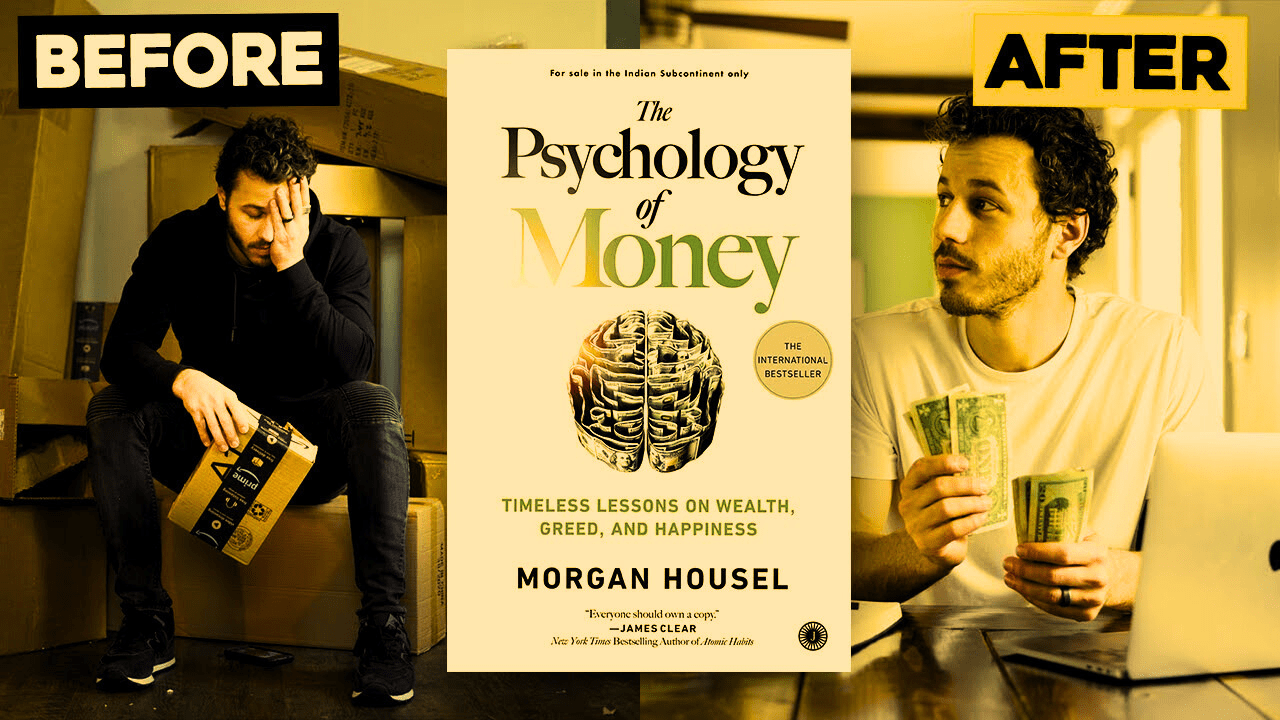
1. Financial success is not a hard science. It’s a soft skill, where how you behave is more important than what you know.
Financial success is not a hard science. It’s a soft skill, where how you behave is more important than what you know.
If I explain it in simple words, this line is simply saying that financial freedom is not like a formula where you get similar results as in a science experiment.
It is a purely behavioral thing that says how you behave with your money matters more than how much you know about the world.
This is because information in today’s world is a lot more accessible, but controlling behavior, like an addiction to impulse buying, is more challenging.
If you master this, you won’t need the world’s knowledge. So, this line is more about psychology than a formula.
2. Luck and risk are siblings. They are both the reality that every outcome in life is guided by forces other than individual effort.
Luck and risk are often considered siblings because they both represent the unpredictable and uncontrollable factors that influence the outcomes of our actions.
Luck:
What is luck actually? Most people take luck as an excuse, but it is not like that. For example, if something you want happens, you say, “My luck is good.”
But if things go wrong, you say, “My luck is bad.” So, the luck factor depends on your perception.
For example, if you unexpectedly get into an accident and lose one leg, there are two ways to think about luck.
One person might think, “Thank God I just lost one leg and didn’t get more seriously harmed.” Another might think, “WTF, this is a life where I can’t even walk for my entire life.”
You can’t change what happens, but your perception will decide your happiness. It is similar in the financial world.
Risk:
Taking risks is important. Risk, in turn, is the potential for loss or failure that accompanies every decision or action.
It is the uncertainty that arises from the unknown outcomes of our choices. For example, investing in a company without knowing its future prospects involves risk.
Similarly, starting a new business without a clear plan involves risk. What you can do is simply make a Plan B for every big decision or risk you take.
For example, if you started a blog and have $1000, you need to make a Plan B, like “If I fail in this, then I will do this other work or something else that will not impact my life too much.”
3. It is important to remember when judging success — both your own and others’: “Nothing is as good or as bad as it seems.
It is important to remember that looks can be misleading while evaluating success, whether it be your own or that of others.
This is why the saying “Nothing is as good or as bad as it seems” is used. It pushes you to see past appearances and weigh the entire picture before passing judgment.
Do you think that your life is worse or that your success is meaningless?
When you open Instagram and see people around the world doing amazing work, you might start thinking badly about yourself. If that’s the case, you’re in a big trouble.
The way you see the success of others and your own success is different.
For example, if you are a creator on Instagram, don’t compare yourself to someone with 1 million followers or 10 million followers creator because you are at a different point in the race.
It doesn’t matter where you are; the only thing that matters is how you compare yourself with your own progress.
Their circumstances might be different from yours—they may have had a positive environment that helped them achieve those results, but that might not be the same for you.
So, find your power and work on it. Don’t blame others; be positive and focused towards your goal.
4. Happiness, as it’s said, is just results minus expectations.
Many people think that if they buy a luxury car, they will be happier. They believe that if they buy an expensive house, they will be the richest person on earth.
Similarly, there are millions of things in the world that most people want to buy to overcome their sadness.
By sadness, I mean that no one in this world can make you happy without a simple perception of your life.
As suggested in the above line, “Happiness, as it’s said, is just results minus expectations.” If you subtract expectations and desires, then you are a happy person.
It’s simple because human wants are unlimited and can’t be fulfilled. So be present, be minimalist, and buy meaningful things that have a serious impact, not for show.
5. You don’t need tremendous force to create extraordinary results.
The important thing to remember is that compounding—the ability to produce spectacular effects over time—can start with little, continuous efforts.
The concept is that small, regular saves and wise financial practices can compound over decades to produce significant wealth, much like tiny amounts of snow can collect over time to form large glaciers and ice sheets.
Because of the power of compounding, even small efforts, when maintained over an extended period of time, can produce enormous benefits.
For instance, let’s say you started a YouTube channel ten years ago. Looking back, you can see how the years have changed your personality, financial situation, and worldview.
The same is true in the world of finance.
